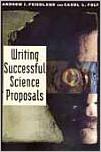| |||||
• polskie
• Zamów informacje o nowościach z wybranego tematu • kontakt |
WRITING SUCCESSFUL SCIENCE PROPOSALSFRIEDLAND A FOLT Cwydawnictwo: YALE UNIVERSITY, 2000, wydanie Icena netto: "An important,
engaging, and substantive book. The authors lead the reader through the proposal maze
logically and clearly." Writing a successful science proposal can seem intimidating and even baffling. What makes one proposal stand out from the tens of thousands that are submitted each year to government agencies, private corporations and foundations, and academic committees? This authoritative and readable book explains every aspect of proposal writing, from conceiving and designing a project to analyzing data, synthesizing results, and estimating a budget. It is a step-by-step guide to writing an effective and competitive scientific proposal. The book starts with a discussion of the earliest ideas and formulations of a project, then examines the issue of authorship, different granting agency formats, and ways to ensure a strong scientific foundation for a proposal. The book offers advice on selecting a strong title, developing an effective summary, articulating objectives and hypotheses, writing a good introduction, choosing experimental designs and methods, planning for expected and unexpected results, and the ethics of research. Guidance on the final phases of a proposal is also provided - how to list references, track the progress of the proposal, revise, and resubmit. For any scientist embarking on a thesis or grant application, this book will prove an essential companion. Andrew J. Friedland is professor in the environmental studies program, and Carol L. Folt is professor in the department of biological sciences, both at Dartmouth College. 171 pages Księgarnia nie działa. Nie odpowiadamy na pytania i nie realizujemy zamówien. Do odwolania !. |


